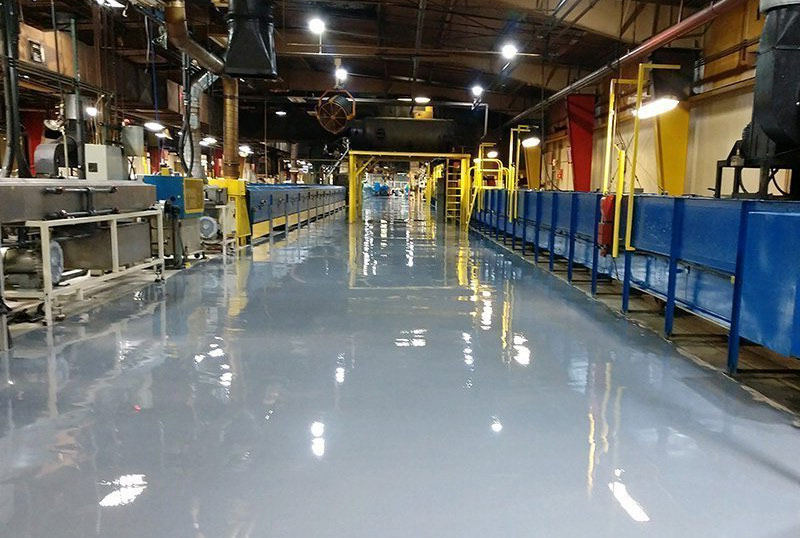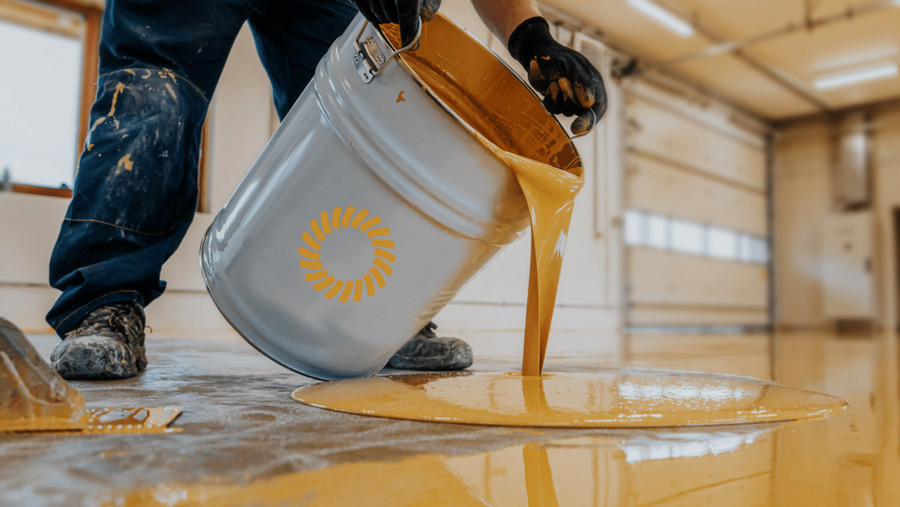Exploring the Different Types of Industrial Floor Coating: Which One is Right for You?
When it comes to industrial floor coatings, it’s important to choose the right one for your specific needs. With a wide range of options available, understanding the different types of coatings can help you make an informed decision. From epoxy to polyurethane, each type offers its unique set of benefits and considerations.
Epoxy coatings, known for their durability and chemical resistance, are a popular choice for high-traffic areas. They provide a seamless and glossy finish, making them easy to clean and maintain. Polyurethane coatings, on the other hand, offer excellent resistance to UV rays and abrasion. They are commonly used in areas exposed to sunlight or heavy machinery.
Other options, such as acrylic and methyl methacrylate (MMA) coatings, provide quick curing times, making them ideal for fast-paced environments. Additionally, there are specialized coatings designed for specific needs, like anti-slip coatings for areas prone to accidents.
Understanding the characteristics and advantages of each type of industrial floor coating will help you select the one that best meets your requirements. So, let’s dive into the details and explore the different types to help you make the right choice for your industrial space.
Benefits of using industrial floor coatings
Industrial floor coatings offer numerous benefits that make them a popular choice for commercial and industrial spaces. Firstly, these coatings provide a protective layer that helps to extend the lifespan of the floor. They act as a barrier against abrasion, chemicals, and other damaging factors, ensuring that the floor remains in good condition even in high-traffic areas.
Secondly, industrial floor coatings enhance safety in the workplace. Many coatings are designed to be slip-resistant, reducing the risk of accidents and injuries. This is especially crucial in industrial settings where spills, oil, and other substances can make the floor slippery. By applying a suitable coating, you create a safer environment for both employees and visitors.
In addition, industrial floor coatings are easy to clean and maintain. They create a seamless and glossy finish, making it easier to remove dirt, dust, and spills. Regular cleaning becomes a breeze, saving you time and effort in the long run. Moreover, these coatings can also improve the aesthetics of your space, giving it a polished and professional appearance.
Epoxy floor coatings
Epoxy floor coatings are one of the most common choices for industrial spaces, thanks to their durability and chemical resistance. These coatings are made from a combination of epoxy resin and a hardener, resulting in a strong and rigid finish. Epoxy coatings are known for their ability to withstand heavy traffic, impacts, and spills, making them ideal for warehouses, factories, and other high-traffic areas.
One of the key advantages of epoxy coatings is their seamless and glossy finish. This not only enhances the appearance of the floor but also makes it easier to clean and maintain. The smooth surface prevents dirt and dust from accumulating, and spills can be wiped away effortlessly. Additionally, epoxy coatings are available in a wide range of colors and can be customized with decorative flakes or patterns to suit your aesthetic preferences.
It’s important to note that epoxy coatings may not be suitable for areas exposed to direct sunlight or extreme temperatures. Over time, prolonged exposure to UV rays can cause the coating to yellow and eventually degrade. However, with proper maintenance and periodic recoating, the lifespan of an epoxy floor can be significantly extended.
Polyurethane floor coatings (not polyurethane cement)
Polyurethane floor coatings are another popular choice for industrial spaces, offering excellent resistance to UV rays, abrasion, and chemicals. These coatings are highly durable and can withstand heavy machinery, making them suitable for areas exposed to intense wear and tear. Polyurethane coatings are commonly used in automotive workshops, warehouses, and manufacturing facilities.
One of the key advantages of polyurethane coatings is their flexibility. Unlike epoxy coatings, which are rigid and may crack under certain conditions, polyurethane coatings are more elastic and can withstand movement and impact. This makes them ideal for areas where there is a higher risk of physical stress, such as forklift traffic or heavy machinery operations.
Polyurethane coatings also provide a high-gloss finish, enhancing the aesthetics of the floor. They are available in various colors and can be customized to create a visually appealing and functional space. Additionally, these coatings have excellent resistance to chemicals, including oils, solvents, and cleaning agents, making them easy to clean and maintain.
Polyaspartic floor coatings
Polyaspartic floor coatings are a relatively new option in the world of industrial floor coatings but have gained popularity due to their fast curing time and durability. These coatings are known for their rapid drying properties, allowing for quick installation and minimal disruption to operations. Polyaspartic coatings are commonly used in areas where downtime needs to be minimised, such as commercial kitchens, hospitals, and retail spaces.
One key advantage of polyaspartic coatings is their fast curing time. Unlike epoxy or polyurethane coatings, which can take several days to fully cure, polyaspartic coatings can be applied and ready for use within a day. This is especially beneficial for businesses that cannot afford to shut down for an extended period for floor coating installation.
Polyaspartic coatings also offer excellent resistance to UV rays, making them suitable for outdoor or semi-outdoor areas. They do not yellow or degrade when exposed to sunlight, ensuring that the floor maintains its appearance and durability over time. These coatings are highly durable and can withstand heavy traffic, impacts, and chemicals, making them a versatile choice for various industrial applications.
Acrylic floor coatings
Acrylic floor coatings are a cost-effective option for industrial spaces that require a basic level of protection. These water-based coatings are typically used in light-duty environments where heavy machinery or extreme conditions are not a concern. Acrylic coatings are commonly used in retail spaces, schools, and healthcare facilities.
One of the advantages of acrylic coatings is their quick drying time. They can be applied and ready for use within a few hours, allowing for minimal disruption to operations. Additionally, acrylic coatings offer good chemical resistance, making them easy to clean and maintain. However, it’s important to note that acrylic coatings may not be as durable as other types and may require more frequent reapplication in high-traffic areas.
Acrylic coatings provide a semi-gloss or matte finish, giving the floor a clean and professional look. They are available in various colors and can be customised to match the aesthetic requirements of the space. While acrylic coatings may not offer the same level of durability as epoxy or polyurethane coatings, they can still provide a cost-effective solution for light-duty industrial environments.
Polyurethane Cement – Cementitious urethane floor coatings
Cementitious urethane floor coatings are a specialised option designed for environments that require high resistance to chemicals, thermal shock, and moisture. These coatings are made from a combination of cement, urethane, and other additives, resulting in a highly durable and versatile finish. Cementitious urethane coatings are commonly used in food and beverage processing plants, pharmaceutical facilities, and chemical storage areas.
One key advantage of polyurethane cement floors is their excellent resistance to chemicals. They can withstand exposure to a wide range of acids, alkalis, solvents, and cleaning agents, making them suitable for areas where spills or leaks are common. These coatings also provide superior resistance to thermal shock, meaning they can handle rapid temperature changes without cracking or delaminating.
Polyurethane cement floors are highly durable and can withstand heavy traffic, impacts, and abrasion. They create a seamless and non-porous surface, preventing the growth of bacteria, mould, and other contaminants. This makes them ideal for environments requiring strict hygiene standards, such as food processing facilities.
Comparing different types of industrial floor coatings
Now that we have explored the different types of industrial floor coatings, let’s compare them based on their key characteristics:
1. Durability: Epoxy, polyurethane, and cementitious urethane coatings offer excellent durability and can withstand heavy traffic, impacts, and chemicals. Polyaspartic coatings are also highly durable but may not be as resistant to chemicals as the other options. Acrylic coatings are less durable and may require more frequent reapplication in high-traffic areas.
2. Chemical resistance: Epoxy, polyurethane, and polyurethane cement floors provide excellent resistance to a wide range of chemicals, making them suitable for areas exposed to spills or leaks. Polyaspartic coatings offer good chemical resistance but may not be as robust as the other options. Acrylic coatings offer moderate resistance to chemicals.
3. UV resistance: Polyurethane and polyaspartic coatings offer excellent UV resistance, making them suitable for outdoor or semi-outdoor areas. Epoxy coatings may yellow and degrade over time when exposed to direct sunlight, while acrylic coatings offer limited UV resistance.
4. Curing time: Polyaspartic coatings have the fastest curing time, allowing for quick installation and minimal downtime. Epoxy, polyurethane, and acrylic coatings have longer curing times, with epoxy typically taking the longest.
5. Aesthetics: Epoxy, polyurethane, poly aspartic, and acrylic coatings are available in various colours and can be customised to create visually appealing spaces. Cementitious urethane coatings are typically available in a limited colour range.
Choosing the right industrial floor coating for your needs
When selecting an industrial floor coating, it’s essential to consider your specific requirements and the conditions in your space. Here are some factors to consider:
1. Traffic: If your space experiences heavy traffic or the movement of heavy machinery, epoxy, polyurethane, or cementitious urethane coatings would be suitable options.
2. Chemical exposure: For areas exposed to chemicals, such as spills or leaks, epoxy, polyurethane, or cementitious urethane coatings offer excellent resistance.
3. Outdoor or semi-outdoor areas: Polyurethane or polyaspartic coatings are recommended for outdoor or semi-outdoor areas due to their UV resistance.
4. Fast installation: If minimising downtime is a priority, polyaspartic coatings are the best choice, as they have the fastest curing time.
5. Cost considerations: Acrylic coatings offer a cost-effective solution for light-duty environments, while epoxy, polyurethane, polyaspartic, and cementitious urethane coatings are more suitable for heavy-duty applications.
By carefully considering these factors and consulting with a professional, you can choose the right industrial floor coating that meets your specific needs and ensures the longevity and functionality of your space.
Final Thoughts
Choosing the right industrial floor coating is crucial for maintaining the functionality, safety, and aesthetics of your space. Each type of coating offers its unique set of benefits and considerations. Epoxy coatings provide durability and chemical resistance, while polyurethane coatings offer UV resistance and flexibility. Polyaspartic coatings provide rapid curing times, and acrylic coatings offer a cost-effective solution. Cementitious urethane coatings are designed for high resistance to chemicals, thermal shock, and moisture.
By understanding the characteristics and advantages of each type of industrial floor coating, you can make an informed decision that best suits your requirements. Whether you need a coating for a warehouse, manufacturing facility, or commercial space, there is a suitable option available to enhance the durability, safety, and aesthetics of your floors. Invest in the right industrial floor coating and enjoy the benefits it brings to your business for years to come.
Contact Diamond Grind by Email or 1800 587 172
for an obligation FREE consultation.

